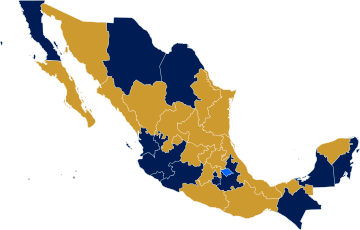Same-sex marriage in Puebla
Same-sex marriages became legal in the Mexican state of Puebla on 1 August 2017, with a ruling by the Supreme Court of Justice of the Nation (Mexican Supreme Court) striking down Article 300 of the Civil Code, which limited marriage to one man and one woman and Article 294, which stated that marriage existed solely for the purpose of procreation.[1] The SCJN further removed the requirement for individuals to obtain an amparo (injunction) for same-sex marriage in the state,[2] concurring with the National Commission of Human Rights (Spanish: Comisión Nacional de los Derechos Humanos) that the Civil Code violated the self-determination of LGBTI citizens.[3][4]
History

Legislation
On 7 December 2006, a similar civil union bill to that of Mexico City was proposed in Puebla, but it faced strong opposition and criticism from deputies of the Institutional Revolutionary Party (PRI) and the National Action Party (PAN), who declared that "the traditional family is the only social model, and there cannot be another one."[5] On 15 March 2011, the Law of Society for Coexistence was proposed again.[6] After five reviews in the ensuing years,[7] on 8 June 2014, the law was postponed until a later session.[8] On 29 September 2014, the Legislature announced that there would be no discussion in that legislative term.[9]
On 7 March 2013, a group of activists presented to the Congress of Puebla a proposal, "The Law of Agnès Torres", which aimed at modifying Articles 831, 931, 932 and 935 of the Civil Code of Puebla and Article 751 of the Code of Civil Procedure to allow legal identity documents which are consistent with the personality and sex/gender identity of personal choice and protect LGBT citizens from discrimination.[10] On 8 November 2014, a march was held by activists and supporters, urging the Congress to pass the law to protect gender identity and approve same-sex marriage.[11]
The Congress rejected a civil unions bill in December 2014.[12] PRD, who backed the civil unions bill, announced their intention to re-introduce the bill in 2015.[13] On 11 June 2015, a member of PRD submitted a marriage bill instead citing the national court decisions in favor of same-sex couples wanting to marry.[14] On 18 June 2015, it was announced that the marriage proposal will be reviewed in October, giving deputies time to become educated about the proposal before it is submitted for analysis.[15] In June 2016, representatives of the Congress of Puebla announced that they would not legalize same-sex marriage, at least not until the Mexican Supreme Court rules on the action of unconstitutionality filed in early May (see below).[16]
Injunctions (amparos)
A decision of the Mexico Supreme Court on 12 June 2015 resulted in a ruling that found that state bans on same-sex marriage were unconstitutional. The court's ruling is considered a "jurisprudential thesis" and did not invalidate any state laws, meaning same-sex couples denied the right to wed would still have to seek individual injunctions. The ruling standardized the procedures for judges and courts throughout Mexico, to approve all applications for same-sex marriages and made the approval mandatory.
An important recognition case was granted via injunction on 29 January 2014. A same-sex couple, married in 2012 in Mexico City, had filed an injunction against the IMSS (Instituto Mexicano del Seguro Social) after it refused to register the partner of one of the men for spousal benefits. In a landmark ruling, the Supreme Court of the Nation ruled that the IMSS was required to recognize the marriage.[17]
Equal Marriage Mexico, the Citizens Observatory of Sexual and Reproductive Rights, and El Taller AC began collecting signatures for a collective injunction in Puebla in early October 2014 with plans to submit the demand on 12 October.[18] On 15 October 2014, it was confirmed that a collective injunction for the legalization of same-sex marriage had been filed by 36 people from throughout the state hoping to gain the right to same-sex marriage and have Article 294 of the Civil Code declared unconstitutional.[19][20] In March 2015, reports surfaced that the judge had not ruled for the couples citing a requirement of the plaintiffs to "prove their homosexuality". Activists slammed this as a delay tactic and appealed to both the local court and the Mexican Supreme Court.[21] On 5 May 2016, the Mexican Supreme Court ruled that Articles 294 and 297 of Puebla's Civil Code were unconstitutional. These two articles denied marriage rights to same-sex couples.[22] On 1 June 2016, the First Chamber of the Mexican Supreme Court upheld an amparo to 30 gay people who challenged Articles 294 and 297 of the State Civil Code.[23]
In November 2014, a lesbian couple filed for an amparo and were granted an injunction to marry. The state appealed the decision. On 10 July 2015, the Appellate Court upheld the ruling in favor of the couple. Their wedding, which was the first same-sex marriage in the state of Puebla, took place on 1 August 2015.[24][25] The fifth same-sex marriage in the state took place in March 2017 in Tepeaca.[26]
San Pedro Cholula
In September 2016, officials from the municipality of San Pedro Cholula announced that any same-sex couple who wishes to marry in the municipality may do so without the need for an amparo, citing the jurisprudence established by the Supreme Court in June 2015.[27]
Action of unconstitutionality (2016/17)

On 27 April 2016, an action of unconstitutionality was filed before the Mexican Supreme Court.[28][29] This lawsuit sought to fully legalise same-sex marriage in Puebla, similarly to what had happened in the states of Chiapas and Jalisco. Actions of unconstitutionality in Mexico can, however, only be filed against a certain law within a 30 day period after they come into force. In this case, the Congress of Puebla modified its marriage laws, but left intact provisions outlawing same-sex marriages. This qualified for an action of unconstitutionality, which LGBT groups quickly filed.
On 1 August 2017, the Mexican Supreme Court ruled that Article 300 of the Civil Code, which limited marriage to one man and one woman, and Article 294, which stated that marriage existed solely for the purpose of procreation, were unconstitutional.[1]
In late January 2018, after multiple attempts from Congress to delay the ruling of the Supreme Court, the Civil Registry announced that it would abide by the ruling, bypassing the Congress' authority, which was opposed to the ruling and had repeatedly tried to stop it from being enforced.[30][31] The Civil Registry's announcement also followed a ruling of the Inter-American Court of Human Rights, which states that countries signatory to the American Convention on Human Rights must legalise same-sex marriage. Mexico has ratified the Convention.
See also
References
- 1 2 "SCJN aprueba matrimonio igualitario en Puebla" [SCJN approves equal marriage in Puebla] (in Spanish). Puebla City, Mexico: Publimetro. 1 August 2017. Retrieved 1 August 2017.
- ↑ "SCJN avala los matrimonios homosexuales en Puebla" [SCJN guarantees homosexual marriages in Puebla] (in Spanish). Mexico: Noticias MVS. 1 August 2017. Archived from the original on 1 August 2017. Retrieved 1 August 2017.
- ↑ "SCJN avala el matrimonio igualitario en Puebla" [SCJN backs egalitarian marriage in Puebla] (in Spanish). Mexico: SDPnoticias. 1 August 2017. Archived from the original on 1 August 2017. Retrieved 1 August 2017.
- ↑ "Corte abre puerta a martimonios gay en Puebla" [Court opens the door to gay marriage in Puebla] (in Spanish). Mexico City, Mexico: El Universal. 1 August 2017. Archived from the original on 1 August 2017. Retrieved 1 August 2017.
- ↑ Alejrandro Velázquez (27 January 2007). "Más estados van por Ley de Convivencia" (in Spanish). Crónica. Retrieved 15 December 2009.
- ↑ "Iniciativa que expide la Ley de Sociedad de Convivencia para el Estado de Puebla". congresopuebla.gob.mx.
- ↑ "Puebla - Ley de Sociedad de Convivencia - Poblanerías en línea". poblanerias.com.
- ↑ "Puebla no aprobará aborto, Leyes de Sociedades de Convivencia y Agnes". intoleranciadiario.com.
- ↑ Congreso de Puebla no abordará despenalización del aborto y sociedades de convivencia Archived 6 October 2014 at the Wayback Machine.
- ↑ Lado B. "Presentan propuesta de Reforma de Ley Agnes Torres". ladobe.com.mx.
- ↑ Marchan en Puebla para exigir legislación que proteja los derechos de la población LGBTT Archived 22 November 2014 at the Wayback Machine.
- ↑ "Bloquea el Congreso durante cuatro legislaturas la despenalización del aborto". La Jornada de Oriente.
- ↑ Marisol Córdoba. "PRD propondrá legalizar aborto y sociedades de convivencia en Puebla". pueblaonline.com.mx.
- ↑ "PRD presenta ante el Congreso de Puebla inciativa para permitir el matromonio gay". periodicocentral.mx.
- ↑ "Hasta octubre el Congreso analizará matrimonio gay" (in Spanish). Puebla, Mexico: Diario Cambio. 19 June 2015. Retrieved 19 June 2015.
- ↑ Olivera, Alejandra (26 June 2016). "Congreso de Puebla aprobará matrimonio gay hasta que SCJN lo "obligue"". Ángulo 7.
- ↑ Gay Couples In Mexico To Access Social Security, Health Benefits
- ↑ Josué Cantorán. "Van por el matrimonio igualitario en Puebla". ladobe.com.mx.
- ↑ Staff Puebla On Line. "Homosexuales en Puebla iniciarán proceso jurídico para casarse". pueblaonline.com.mx.
- ↑ Interponen amparo para que se reconozcan matrimonios gay en Puebla Archived 31 October 2014 at the Wayback Machine.
- ↑ "Juez de Puebla viola el Protocolo contra homofobia de la SCJN". El Big Data.
- ↑ AMPARO EN REVISIÓN 48/2016
- ↑ "SCJN reitera la constitucionalidad del matrimonio gay". Noticias - Gaceta Mexicana. 1 June 2016.
- ↑ Hernández Alcántara, Martín (31 July 2015). "Mañana se celebrará el primer matrimonio gay en la historia de Puebla" (in Spanish). Puebla, Mexico: La Jornada de Oriente. Retrieved 31 July 2015.
- ↑ Fernández, Tuss (2 August 2015). "Se celebra en Puebla la primera boda de personas del mismo sexo" (in Spanish). Puebla, Mexico: La Dobe. Retrieved 3 August 2015.
- ↑ (in Spanish) Realizan en Tepeaca quinta boda gay de Puebla
- ↑ (in Spanish) San Pedro abre las puertas al matrimonio entre personas del mismo sexo
- ↑ (in Spanish) Índice de Acciones de Inconstitucionalidad
- ↑ "CNDH impugna reforma en Puebla que excluye el matrimonio igualitario" (in Spanish). Periódico Central. 17 May 2016.
- ↑ (in Spanish) Registro Civil acataría dictamen de la SCJN sobre el matrimonio igualitario: Carrasco
- ↑ (in Spanish) Matrimonio homosexual: Bloquea el Congreso exhorto a favor
